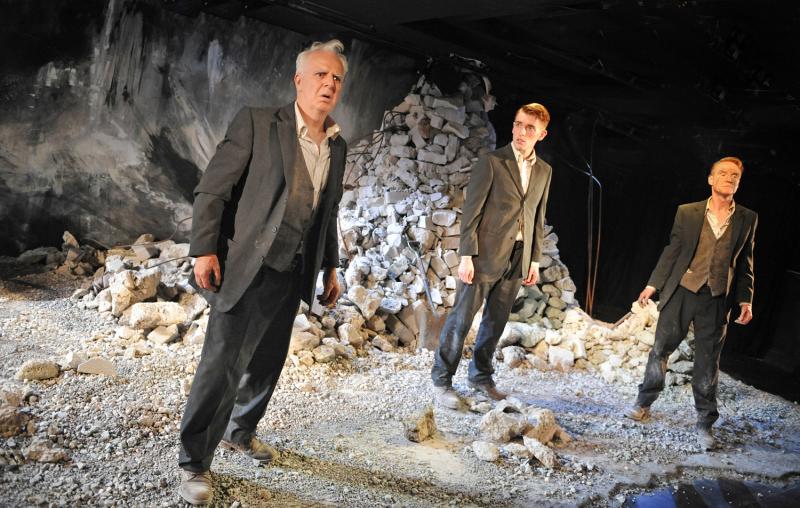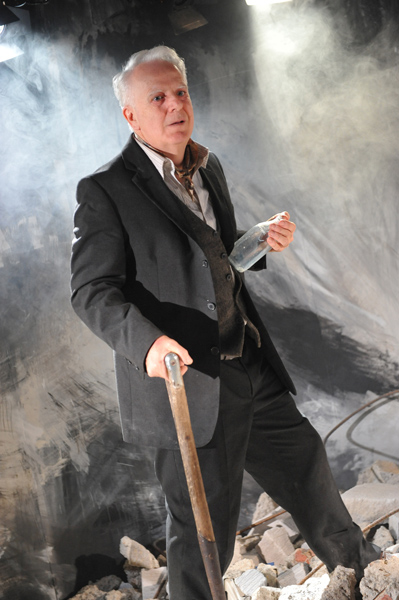The Kingdom, Soho Theatre | reviews, news & interviews
The Kingdom, Soho Theatre
The Kingdom, Soho Theatre
Colin Teevan’s new play is immensely ambitious but also intractable and baffling

Finding the mythic echoes of the ancient Greeks in stories about the modern world is not just confined to past greats such as TS Eliot, but is also used by contemporary adapters of old tragedies. Yet Colin Teevan’s new play, which shadows the lives of Irish navvies working in England with echoes from Greek tragedy, goes one better.
Teevan’s ambitious idea is to marry stories from the great migrations of Irish workers to England, from the 19th century to the 1970s, with the tragedy of Oedipus. The result is part history reimagined, part classical mythology and part psychological nightmare. It is a subtle, sinewy and serpentine text that creates a unique world which is both intellectually impressive and, for the average audience member (including me), frankly rather baffling. Sadly, it's also a bit dramatically inert.
The first problem is that Teevan attempts to retell the Oedipus myth by using just three speakers, three men: one old, one middle-aged and one young. Between them, they share all the characters, from Oedipus to King Laius and Queen Jocasta, from the Sphinx to the blind seer Tiresias. Plus assorted other characters. On the page this is immensely impressive; on stage it is asking a lot. It is difficult to follow. You lose your bearings. Soon I began to feel that I was trapped in a never-ending labyrinth, where dark tunnels only occasionally break into caverns dimly lit by spluttering torches and where the hot breath of the Minotaur might raise the hairs on the back of your neck.
 I felt lost, puzzled, and then suddenly dazzled by a passage of exceptional writing. This myth-land is an odd place. Characters have comprehensible names such as Boss Carbery and John Bull, but they are also called Horse, Elephant, Prophet and Angel. In this strange hybrid play the great migrations of Irish workers have a strong contemporary resonance — they are the makers of modern Britain. At the same time, Teevan — who was born in Ireland — paints a picture of Irishness as Diaspora: there is pain, grit and ambition. Exile. And the hardness of the life of the migrant who has nothing to sell but his muscle power is echoed by the hard rocks of the stony, barren set.
I felt lost, puzzled, and then suddenly dazzled by a passage of exceptional writing. This myth-land is an odd place. Characters have comprehensible names such as Boss Carbery and John Bull, but they are also called Horse, Elephant, Prophet and Angel. In this strange hybrid play the great migrations of Irish workers have a strong contemporary resonance — they are the makers of modern Britain. At the same time, Teevan — who was born in Ireland — paints a picture of Irishness as Diaspora: there is pain, grit and ambition. Exile. And the hardness of the life of the migrant who has nothing to sell but his muscle power is echoed by the hard rocks of the stony, barren set.
On this rocky road and building site, designed by Jessica Curtis, the three actors spend the play digging the ground, breaking up rocks and shovelling the pieces into a truck. Digging is also a metaphor for excavating old truths and hidden secrets. As well as rapes and other crimes, there is a tinker’s curse and an ambiance soaked with beliefs about the Holy Virgin. As each actor talks directly to the audience, rather than to the other characters on stage, the narrative loops and loops.
Comprehension is not helped by Pitman Wallace’s production, which gives the three men plenty of hard work to do with shovels and picks, none of it remotely convincing, but all of it effectively distracting. In a dusty, hard environment, the actors do their best with this difficult tale: as the Young Man, Anthony Delaney’s freshness and spirit contrasts well with Owen O’Neill (award-winning one-man performer and adaptor of The Shawshank Redemption) and his passionate intensity. By the end, both men are eclipsed by Gary Lilburn (pictured above right), who achieves a haunting resonance in his final speech. But, even at 70 minutes, this is an intractable and gruelling evening.
rating
Share this article
The future of Arts Journalism
You can stop theartsdesk.com closing!
We urgently need financing to survive. Our fundraising drive has thus far raised £49,000 but we need to reach £100,000 or we will be forced to close. Please contribute here: https://gofund.me/c3f6033d
And if you can forward this information to anyone who might assist, we’d be grateful.

Subscribe to theartsdesk.com
Thank you for continuing to read our work on theartsdesk.com. For unlimited access to every article in its entirety, including our archive of more than 15,000 pieces, we're asking for £5 per month or £40 per year. We feel it's a very good deal, and hope you do too.
To take a subscription now simply click here.
And if you're looking for that extra gift for a friend or family member, why not treat them to a theartsdesk.com gift subscription?
more Theatre
 Othello, Theatre Royal, Haymarket review - a surprising mix of stateliness and ironic humour
David Harewood and Toby Jones at odds
Othello, Theatre Royal, Haymarket review - a surprising mix of stateliness and ironic humour
David Harewood and Toby Jones at odds
 Macbeth, RSC, Stratford review - Glaswegian gangs and ghoulies prove gripping
Sam Heughan's Macbeth cannot quite find a home in a mobster pub
Macbeth, RSC, Stratford review - Glaswegian gangs and ghoulies prove gripping
Sam Heughan's Macbeth cannot quite find a home in a mobster pub
 The Line of Beauty, Almeida Theatre review - the 80s revisited in theatrically ravishing form
Alan Hollinghurst novel is cunningly filleted, very finely acted
The Line of Beauty, Almeida Theatre review - the 80s revisited in theatrically ravishing form
Alan Hollinghurst novel is cunningly filleted, very finely acted
 Wendy & Peter Pan, Barbican Theatre review - mixed bag of panto and comic play, turned up to 11
The RSC adaptation is aimed at children, though all will thrill to its spectacle
Wendy & Peter Pan, Barbican Theatre review - mixed bag of panto and comic play, turned up to 11
The RSC adaptation is aimed at children, though all will thrill to its spectacle
 Hedda, Orange Tree Theatre review - a monument reimagined, perhaps even improved
Scandinavian masterpiece transplanted into a London reeling from the ravages of war
Hedda, Orange Tree Theatre review - a monument reimagined, perhaps even improved
Scandinavian masterpiece transplanted into a London reeling from the ravages of war
 The Assembled Parties, Hampstead review - a rarity, a well-made play delivered straight
Witty but poignant tribute to the strength of family ties as all around disintegrates
The Assembled Parties, Hampstead review - a rarity, a well-made play delivered straight
Witty but poignant tribute to the strength of family ties as all around disintegrates
 Mary Page Marlowe, Old Vic review - a starry portrait of a splintered life
Tracy Letts's Off Broadway play makes a shimmeringly powerful London debut
Mary Page Marlowe, Old Vic review - a starry portrait of a splintered life
Tracy Letts's Off Broadway play makes a shimmeringly powerful London debut
 Little Brother, Soho Theatre review - light, bright but emotionally true
This Verity Bargate Award-winning dramedy is entertaining as well as thought provoking
Little Brother, Soho Theatre review - light, bright but emotionally true
This Verity Bargate Award-winning dramedy is entertaining as well as thought provoking
 The Unbelievers, Royal Court Theatre - grimly compelling, powerfully performed
Nick Payne's new play is amongst his best
The Unbelievers, Royal Court Theatre - grimly compelling, powerfully performed
Nick Payne's new play is amongst his best
 The Maids, Donmar Warehouse review - vibrant cast lost in a spectacular-looking fever dream
Kip Williams revises Genet, with little gained in the update except eye-popping visuals
The Maids, Donmar Warehouse review - vibrant cast lost in a spectacular-looking fever dream
Kip Williams revises Genet, with little gained in the update except eye-popping visuals
 Ragdoll, Jermyn Street Theatre review - compelling and emotionally truthful
Katherine Moar returns with a Patty Hearst-inspired follow up to her debut hit 'Farm Hall'
Ragdoll, Jermyn Street Theatre review - compelling and emotionally truthful
Katherine Moar returns with a Patty Hearst-inspired follow up to her debut hit 'Farm Hall'
 Troilus and Cressida, Globe Theatre review - a 'problem play' with added problems
Raucous and carnivalesque, but also ugly and incomprehensible
Troilus and Cressida, Globe Theatre review - a 'problem play' with added problems
Raucous and carnivalesque, but also ugly and incomprehensible

Add comment